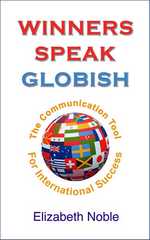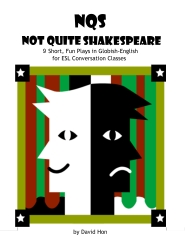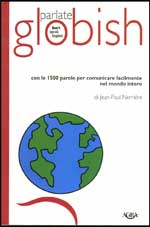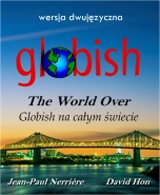<p style="text-align: justify;">This interview was given to Elia P.Pekica Pagon in Zagreb, chief editor for<br />EPOHA, a Croatian cultural magazine.</p>
<p style="text-align: justify;">the great people of our time<br />Jean-Paul Nerriere</p>
<p style="text-align: justify;"><span style="color: #ff0000;">GLOBISH</span><br /><span style="color: #ff0000;">the communication of the future</span></p>
<p style="text-align: justify;">By Elia Patricia PEKICA PAGON</p>
<p style="text-align: justify;">After reading the article in the newspapers about the extraordinary man who decided to publish a book about better global understanding between various nationalities, I immediately decided to contact him. His name is Jean-Paul Nerriere and he is French. According to Jean-Paul, the communication of the third millenium will be based on Globish, the worldwide dialect. He was very friendly and he agreed to make an interview with me for Epoha magazine which we are proudly presenting to our readers, who will sooner or later become the speakers of Globish dialect.</p>
<p style="text-align: justify;"><strong>§ English is the world's most widely used language, or in other words English language is the international language and thus the most widely spread medium of communication with the interlocutors from all around the world. We can say that today without the knowledge of English a person is totally lost in every field of human activity. I wonder, what motivated you to create such an interesting project like 'Parlez Globish'?</strong></p>
<p style="text-align: justify;">In the late 1980s, I was a Vice President with IBM USA, more specifically in charge of International Marketing. My job gave me the opportunity to travel a lot around the world. I went very often to Tokyo and Seoul. I did my best to speak English there, and so did my local counterparts with me. This is where I observed that my communication with the Japanese and the Koreans was much easier and more efficient than what could be observed between them and the American or British employees who came with me to visit our operations in theses countries. Then, I observed it was the same in all non English speaking countries. I came to the conclusion that the language non Anglophones spoke together was not English, but something which sounded vaguely like it, but in which we were better off than genuine Anglophones. I refined the thinking, added more detailed observations, and made a theory out of it: this is Globish, the worldwide dialect of the third millennium. English is not really needed, Globish is enough to reach and enjoy fruitfully the “threshold of understanding” (which is what you need).</p>
<p style="text-align: justify;"><strong>§ English language has, thanks to large multinational companies of American and British origin, become the most dominant language in the world and it has conquered all other languages. World politics and the postmodern trend of globalization supports this victory. The languages of smaller countries are imperilled. Some of them are disappearing, and some of them are already dead. Please tell me how the Anglicisms function in the life of French language, considering the mass media, economy, politics and everyday life?</strong></p>
<p style="text-align: justify;">The French language is loaded with words that came from English, and have been coming from English for centuries. But English is loaded with words which came from French when William the Conqueror became king of England in 1066. French is also loaded with words from other origins, from everywhere. This is the way languages evolve, live: they attract words, and keep them. I do not think it’s a serious danger for my language, nor for any other one; we have been doing this forever. The danger is that languages of lesser coverage could disappear from the spoken world, because people would find English easier and more convenient. This will not happen with Globish; let me demonstrate.</p>
<p style="text-align: justify;">If I said “I know the way to make French the privileged worldwide communication vehicle today, again”, everybody, especially in France, would say “great, please tell us, at long last we will win over our leading contender, English”; I would then say “it’s easy, cut the French vocabulary down to 1.500 words, be happy with just an understandable accent, do not expect to discuss metaphysics, use simple sentences, and the elementary, although correct, grammar”. Then everybody would yell “he wants to murder our language! This is unacceptable”.</p>
<p style="text-align: justify;">People should also accept that, when I recommend to do that to the leading contender, English, I am not helping it. As a consequence, I am helping the rescue of French, of Croatian, and of all the languages that are threatened by English today, but will not be endangered at all by Globish. You understand why it’s in your best interest to support Globish, if you like your culture and its language.</p>
<p style="text-align: justify;"><strong>§ You said that Globish will contribute to the preservation and purification of the French language and all other languages, being threatened and invaded by English. Will your revolutionary project ‘Parlez Globish’ be able to help us prevent local cultures and languages from being conquered by the dominating English language?</strong></p>
<p style="text-align: justify;">I just treated this point: yes, it will limit the influence of the English language dramatically. However, it can do nothing against the invasion of the Anglo-Saxon culture, and especially the American culture through the mass media: American television programs are invading us, and spreading a vision of the world that is alien to our cultures, but it comes unnoticed, especially in countries like mine where they are translated into French, and sound perfectly French to the audience.</p>
<p style="text-align: justify;"><strong>§ Would you define Globish as a new artificial language, or as a simplifying tool for easier communication between various nations?</strong></p>
<p style="text-align: justify;">First of all, it’s not a language. A language is the vehicle of a culture. It carries a heritage coming from history. Actually it also shapes the way we think and act, it is the DNA of a culture. Globish has no such ambition, it is only a tool to communicate internationally. It’s simple, hence needs only a limited investment to master it at the proper level. It’s enough for whatever need you may have. It might not be always elegant, but it serves its purpose. On top of that, as opposed to Esperanto, it’s not artificial. It derives from the observation that some kind of English is spoken everywhere. Instead of fighting this reality, and dreaming of something better, it aims at taking advantage of it. It capitalizes on it. English is there, in France, in Croatia; what is the best thing we can do with it?</p>
<p style="text-align: justify;"><strong>§ As I am the Professor of English and Italian languages and literature, and also speak several other languages, I like the idea about your project very much and I can't wait to read this manual about Globish in any version. Please tell me how did the French linguists accept your book and your manual and what was the reception of your books like in other countries?</strong></p>
<p style="text-align: justify;">The manual was released in May, and the reactions so far are very positive. The manual is perceived by the people who read it as very innovative. The reason is that it was written by three people:<br />- one of them used English extensively, but was never a teacher (me)<br />- the second one has been a teacher in France, and believed in Globish genuinely<br />- the third one has been a teacher in Quebec.<br />Each of us had different ideas. We exchanged several thousands of emails to reach agreements, but the book is not yet one more manual written by a singe teacher. The Quebec guy had ideas about pronunciation that have been unheard of in France, for what we know.</p>
<p style="text-align: justify;">The original book “Parlez Globish” was published a year ago. It’s not a manual. It develops and demonstrates a theory, and gives only a beginning of the recipes to make it work. It describes the potential consequences of this theory on English, and on the other languages in the world. It received a very warm welcome in France, and in a number of other countries. It’s in the process of being adapted in Italian, Spanish, and Korean. As a priority, I would like to have it in English, Chinese, Japanese and Portuguese, but this have yet to materialize. All languages are interesting to me, and you should consider it in Croatian. It was covered by more than 60 medias in France and abroad, in positive terms with one single exception which was doubtful.</p>
<p style="text-align: justify;">Teachers in France divide into two groups. Those who believe their job is to help children find a place, a job in this difficult world: they support me wholeheartedly. And those who think their job is to open the children’s minds, to help them discover the wonderful English culture, leaving to the employers, later in their careers, the responsibility to train the employees in English. These latter teachers are mostly indifferent (we are not on the same goals), and sometimes hostile when we enter a discussion.</p>
<p style="text-align: justify;"><strong>§ How did the French business people accept Globish?</strong></p>
<p style="text-align: justify;">With great interest at the individual level.</p>
<p style="text-align: justify;">Now, we have an integrated solution:<br />- a concept in the first book “Parlez Globish” (“Speak Globish”)<br />- a manual helping you master it in six months “Découvrez le Globish” (“Discover Globish”), the second book.<br />- a company of several hundred trainers in English teaching, specializing in large companies, with a set of courses dedicated to Globish (“Westmill”, in Paris)<br />- a piece of software (“Glolexis”, developed by the French Company “Diagonal”) helping you to write in Globish: you type in English, and it highlights the words you use which are not part of the regular Globish vocabulary. In September, it will automatically offer Globish synonyms to replace your word, if there are any (there are cases where you need to give a definition, as there is no direct alternative).</p>
<p style="text-align: justify;">With this, a company is able to bring its employees to the expected level in six months; all the papers circulated in the company, and outside, will be in Globish, and readily understood by everyone. You can visualize the savings in terms of time and money. We are now entering the Company campaign. I recently presented all of this at Airbus, and people were very interested, and a bit surprised. I need to follow up with them, and address the whole business world. But it needs a lot of time!</p>
<p style="text-align: justify;"><strong>§ In which countries are Globish book and manual available and where are they most popular and why?</strong></p>
<p style="text-align: justify;">The manual (book no 2) was just released in French in May 2005., pending translations which have yet to be requested. It was covered, along with the concept and the first book, in many countries. The highest levels of excitement were observed in Italy, Argentina, Chile, Brazil, Korea, and the US. It’s true that the media coverage did not take place in Spain, but instead of that we had large media coverage in Argentina and Chile. The Times in London, and the BBC covered the concept and the first book, but this didn’t result in an enormous flow of e-mails on the site. Maybe our British neighbours are less interested, or do not feel the need. I am afraid they might very well be proven wrong. Some American citizens think it would be extremely useful to their countrymen, and told me in very eloquent terms.</p>
<p style="text-align: justify;"><strong>§ When do you plan to present your books to the Croatian public?</strong></p>
<p style="text-align: justify;">I hope you do that soon. I love your country, and spent three summers sailing the coast. What is needed is a publisher, and someone who reads French well enough to understand the book, and replace a number of illustrations which are specific to France by other equivalent ones that would mean something to your countrymen. Let’s do it!</p>
<p style="text-align: justify;"><strong>§ How many words does Globish consist of?</strong></p>
<p style="text-align: justify;">There are 1.500 words. The list can be downloaded from the website www.jpn-globish.com. This is a lot, as many English words become other words, which are then viewed as legitimate in Globish. For instance, “care” gives you “careful, carefully, carefulness, careless, carelessly, carelessness, uncaring,”, etc,… Many words are missing though, on purpose to keep it light. For instance, you should not use “nephew”, too complicated for many people in the world. Instead, you will say “the son of my brother”, and you do not lose anything in terms of precision. When you are used to it, it becomes automatic.</p>
<p style="text-align: justify;"><strong>§ According to which grammatical rules does Globish function?</strong></p>
<p style="text-align: justify;">The English grammar. Nothing else. Globish is not incorrect English. It is “English light”. We recommend simple sentences, but each of them is constructed along the usual rules. As they are shorter, they are less convoluted.</p>
<p style="text-align: justify;"><strong>§ What is the main goal of Globish and how do you picture its future?</strong></p>
<p style="text-align: justify;">The goal is to spread, and become an official language which would facilitate the life of everyone, and put everyone on a par. Globish is not easier for an Englishman or an American than it is for me or you. Maybe, some day, it will be accepted as a viable alternative by the European Union or the United Nations, or other international bodies: it would increase their efficiency very fast, and to a great extent. And the national languages like French could hardly complain: it leaves them a great space in which to have a wonderful influence.</p>

Rubriques disponibles
Winners speak Globish
An ebook by Elisabeth Noble
Une Anglophone de naissance consacre un livre au "Globish", facile à lire, bien documenté, plein d'anecdotes et d'observations inédites.
A commander sur www.smashwords.com

A native English speaker wrote a book about "Globish". It is full of anecdotes, easy to read even for non Native English speakers, and it gives a fair and balanced representation of the Globish concept.
Order at www.smashwords.com
Visiteurs
 40,5%
fr-FR
40,5%
fr-FR
 10,7%
Canada
10,7%
Canada
 8,2%
unknown
8,2%
unknown
 6,2%
China
6,2%
China
 5,8%
United States
5,8%
United States
Total: 56 Pays |
2819462
|
|
Translations of Globish The World Over
Globish IN Globish - (GNG)
Globish IN Globish est un cours en auto-apprentissage facile à utiliser tout autant sur un ordinateur que sur n’importe quel téléphone portable muni d’une connexion à Internet. Pour l’utiliser, il vous faut être capable de lire et comprendre les 35 mots les plus communs en anglais, et donc repris en globish (les tests ont montré que ceux qui avaient quitté l’école le plus tôt possible maîtrisaient 850 mots d’anglais, ne serait-ce que parce que nous les utilisons dans le quotidien du français). Dès que vous pensez en dominer plus que 350, vous pouvez débuter au niveau que choisirez, en rapport avec votre capacité.
Les deux premières leçons vous sont offertes gratuitement sur tout ordinateur muni d’un accès à internet.
En travaillant exclusivement en globish, vous pouvez rapidement apprendre la grammaire, et des mots nouveaux, avec leur prononciation, dans le cadre d’une histoire contextuelle. L’apprenant qui arrive au terme de Globish IN Globish devrait se trouver parfaitement à l’aise du niveaux B1-B2 attribués par le « Common European Framework of Reference for Languages » (CEFR).

Globish IN Globish is an extensive self-study course in Globish that is easy to use on either any standard computer with Internet capability. To use it you must be able to read the most-common 350 words in Globish/English. Then you can begin at any point that matches your ability. Try the first two lessons now, for free, on either your mobile phone or on a computer that has Internet.
By working only in Globish, you can quickly learn both grammar, and new words with pronunciation, in a story context. The student who completes Globish IN Globish should be quite capable at B1-B2 (English) levels given by the Common European Framework of Reference for Languages (CEFR).
Not Quite Shakespeare - (NQS)
Not quite Shakespeare (« pas tout à fait du Shakespeare ») est une collection de 9 courtes pièces de théâtre, rédigées entièrement en Globish, avec le vocabulaire original des 1500 mots recommandés. Elle est destinée aux enseignants qui souhaitent mobiliser des classes sur la conversation. NQS donne aux étudiants des rôles à jouer, et les amène dans des domaines d’expression dépassant largement « je vais chez le boulanger acheter le pain ». Ces documents fonctionnent très bien pour la prononciation, d’autant plus que l’apprenant est ici traité comme un acteur, et non plus que comme un étudiant.
Cliquez ici pour une démonstration gratuite, Auditions for God, sous forme de publication électronique dont vous est laissée toute liberté d’usage. « Auditions For God » se joue avec quatre personnages, et ne nécessite rien de plus qu’un pièce pour lire et jouer la pièce. Comme il convenait dans les pratiques du Moyen-Âge, le rôle de Dieu est le mieux rémunéré, et de nombreux acteurs se présentent en audition pour le rôle. Finalement Dieu se porte candidat en personne (et n’est pas vraiment très bon..)

Not Quite Shakespeare is a collection of 9 short, proven plays in 1500 Globish words, for teachers who want to involve their large English-Conversation classes. NQS gives students proven real plays whose subject matter goes far beyond the usual role plays like "going to the store and buying bread". It also works very well for pronunciation tutoring, as the student is treated as an actor with a performance to give, rather than as a student.
Click here to try a free play, Auditions for God, in e-book form, which you may copy and use as you wish. “Auditions For God” is for four characters and needs nothing but a room to read or perform. Based on actual medieval practices, the role of God receives the highest pay, so many actors come to audition for the role. Finally, God himself auditions. (He's not very good.)
President Obama’s Inauguration Speech.
Vous trouverez ci joint la transcription en Globish du discours d'investiture du Président Barak Obama.
Cette transcription est faite en parallèle du texte originel
Bonne lecture

You will find here the speech given by President Obama for his inauguration January 20th, and also its transcription in Globish. The latter would be readily understood by a much larger number of non Anglophone like foreign citizens and immigrants. We hope you enjoy the reading.
Éditions internationales

 Les deux éditions
Les deux éditions
parues en Corée Parution en Italie
Parution en Italie Parution en Espagne
Parution en Espagne
 Les deux éditions
Les deux éditions
parues en chine.

 Globish
Globish Japanese
Japanese Chinese
Chinese Spanish
Spanish


